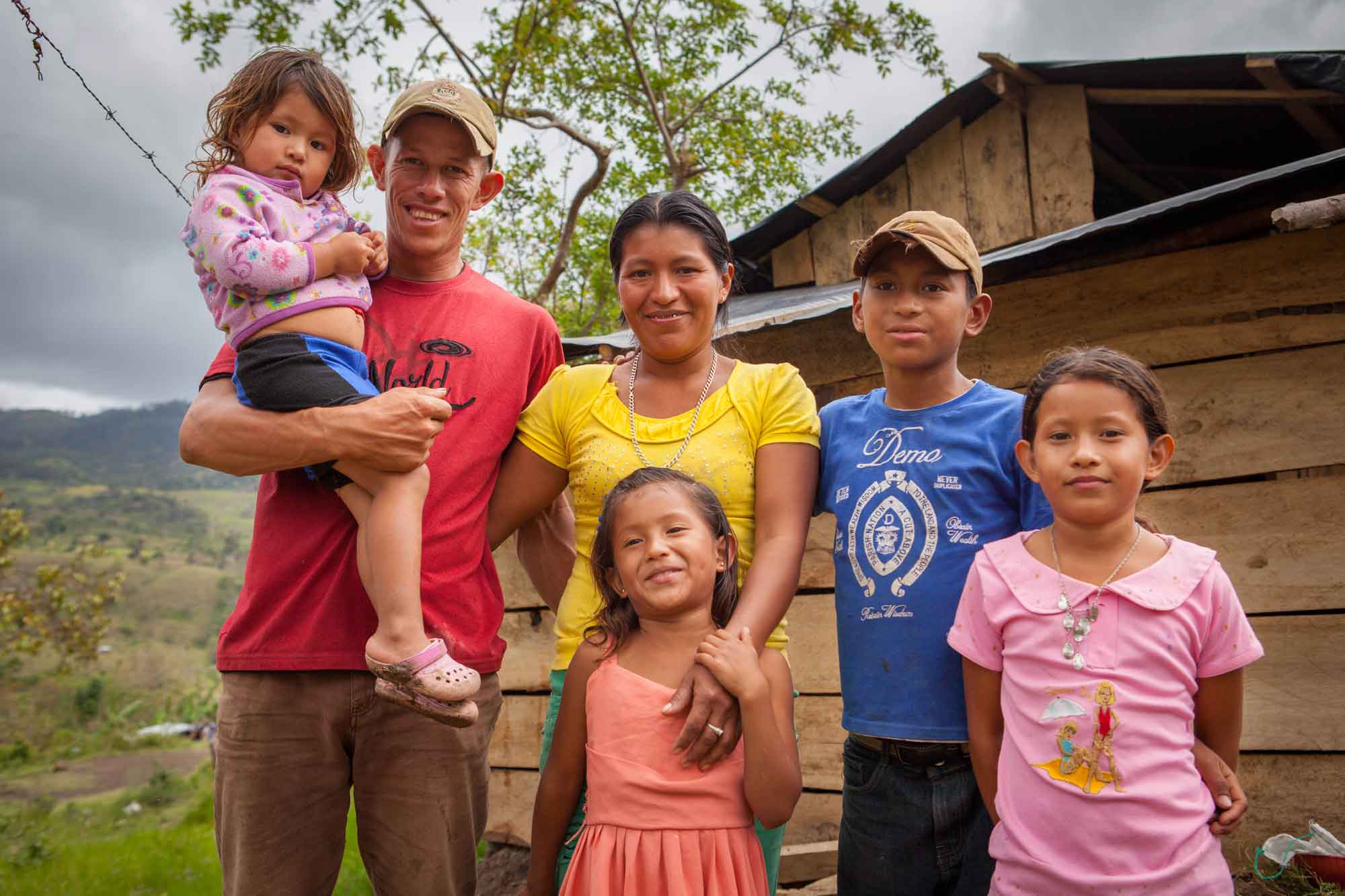
Helping rural poor Nicaragua has been a goal of Agros since 1999. Here is a story of Agros’s work in Nicargua helping rural poor Nicaragua. This is Efrain and Orbelinda’s story.
Driving along the gravel road that runs no more than 100 yards from Efrain’s house, it would be difficult, if not impossible, to know that just up the hill, hidden behind some trees, is a small neighborhood. The cluster of shelters scattered along the hillside, many of them made at least partly out of black plastic, look more like a squatter community, which is essentially what it is, except it is legal.
These homes sit on a piece of land that belongs to the Nicaraguan government. They set aside this piece of land so people who have nothing could have somewhere legitimate (and out of sight) to settle. There is no entrance, no running water, no electricity, and no sewer.

Like other families in the area, Efrain, 28, his wife, Orbelinda, 31, and their four children: Jeyner, 11; Selena, 8; Yesica, 6, and Malin, 3, live without guarantees that they will be able to stay. “[The land is] not mine,” explains Efrain. “We don’t have any documents that show us as the owners.”
The words ‘struggle’ and ‘survive’ come up often in the conversation with Efrain and Orbelinda. Although they try to remain positive, they are honest about what life looks like for them as landless farmers and day laborers.

Their house is no more than 50 square feet, the walls are made of thin wood boards and provide a small measure of privacy. But with the wide gaps between the walls, the family has very little protection from the elements. “When it rains hard or when there is wind, the rain comes inside,” says Orbelinda, noting that the roof (which is made of black plastic) also leaks. Without running water or an easily accessible water source, the family must trek to a nearby creek to bathe, wash, and collect water. They, along with all the other families in the area, use the water source for all these activities, so naturally the water is not very clean.
Efrain works hard as a day laborer on nearby farms to try to provide for his family’s needs. Orbelinda conservatively estimates that they need between $3 and $5 a day just to provide basic food (beans and tortillas) for their family of six. Efrain doesn’t make that much as a day laborer so he tries to make ends meet by growing some of their food. The problem is, he doesn’t have his own land.
I rent land to cultivate, he explains. This growing season, he has rented two manzanas (about 5 acres) to grow beans. In addition to the cost of the seeds and fertilizers necessary for his crop to succeed, he also owes the landowner about $220 for the use of the land.
Nevertheless, Efrain never misses an opportunity. “I’m not afraid of hard work,” he says. “I like hard work.” The only problem is that at least to date it seems, to him, that the harder he works the further behind he seems to get. It doesn’t seem to matter how much effort he invests, a brighter future and the dream of independence seem to get further and further away.
He doesn’t want much, just a chance to control his own destiny and the opportunity to provide a better future for his children. “I would like to have a dignified place to live and my own land to plant,” he says. That’s all.

But although he dreams of owning his own land, when he wakes up each day he is confronted by the daily need to simply survive. “I’ve always just been able to harvest enough for our food,” he says.
For all these reasons, Efrain was excited to learn about the opportunities from Agros how they are helping rural poor Nicaragua. Efrain is excited to try new agricultural techniques. “I like to do things the right way,” he says, explaining how he has meticulously implemented the guidance from the Agros agricultural technicians. “I am seeing the change in the success of this harvest in the area where we applied the techniques from Agros,” he says.
Today, Efrain is a bit more optimistic about his future with Agros helping rural poor Nicaragua. He hopes his family will be selected to move when the new village is established. “For me, the hardest thing [in life] is the land [having my own land],” he says which is why being part of the new regional project would be, as he says — a dream come true!
Thanks to our Coffee Lovers Club members helping rural poor Nicaragua is possible. 2% from every club shipment goes back helping rural poor Nicaragua and other countries through our partnerships with Agros and Food 4 Farmers. You too can help with your daily cup of coffee. Join the Coffee Lovers Club and get your first pound free
